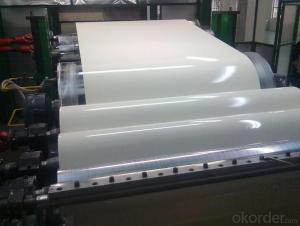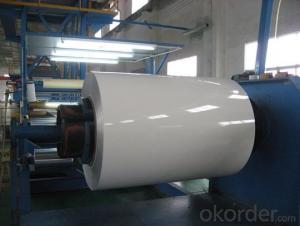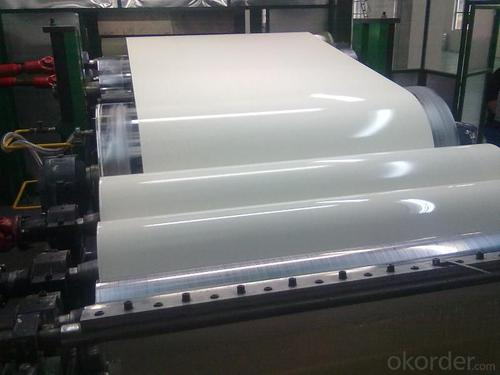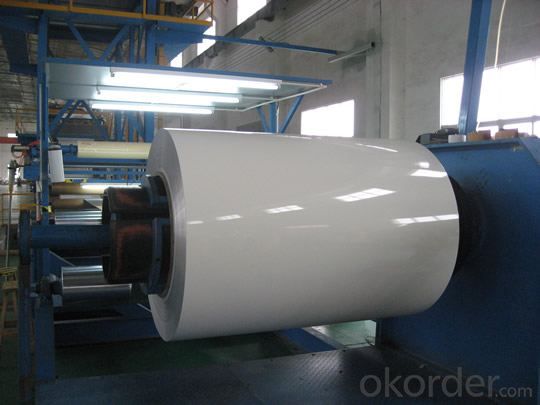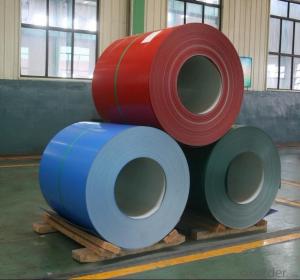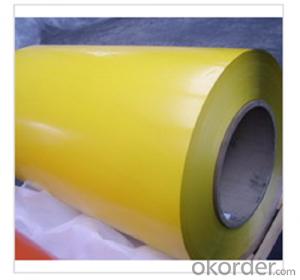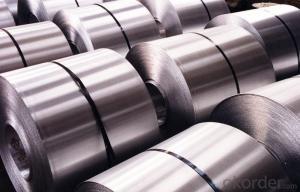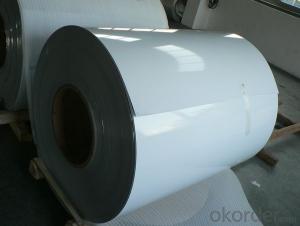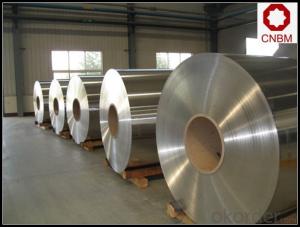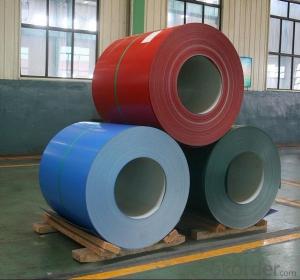Anodized Aluminum Coil Stock for Coated Aluminum Ceiling Panel
- Loading Port:
- Shanghai
- Payment Terms:
- TT OR LC
- Min Order Qty:
- 2 m.t.
- Supply Capability:
- 50000 m.t./month
OKorder Service Pledge
OKorder Financial Service
You Might Also Like
Specification
Coated Aluminium Coil/Roll For Aluminium Ceiling Panel
Description
Alloy | 1060, 1100, 3003, 8011, etc. |
Temper | H16, H18, H24, H26, H28 |
Thickness | From 0.05mm to 3.0mm |
Width | Standard width:1240mm |
Special width:1300mm, 1520mm, 1570mm, 1595mm | |
Diameter | Standard dia:1200mm |
Interior dia:150mm,405mm,505mm | |
Weight | 2.5 T/coil,3.0 T/coil |
Coating | PE, PVDF, ACRYLIC |
Surface | Embossed, mill finish, coated |
Color | AS to code RAL |
Gloss | 10-90%(EN ISO-2813:1994) |
Coating Thickness | PE: more than 18 micron |
PVDF: more than 25 micron | |
Coating Hardness(pencil resistance) | More than 2h |
Coating adhesion | 5J (EN ISO-2409:1994) |
Impact Resistance | No peeling or cracking(50 kg/cm,ASTMD-2794:1993) |
Flexibility(T-bend) | 2T |
MEK resistance | More than 100 |
Advantage | 1.High temperature resistant 2.Weathering resistant 3.Scrubbing resistant 5.Acid or alkali proof 6. Fireproof 7.Light weight material is easy to construct and install |
Out package | Wooden splint with export standard |
Application | ACP, wall cladding, facades, roofs and canopies, ceilings, signboards, blind window, display platforms, electrical panels, etc |
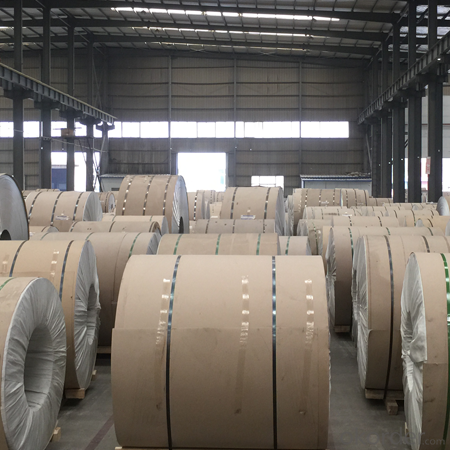
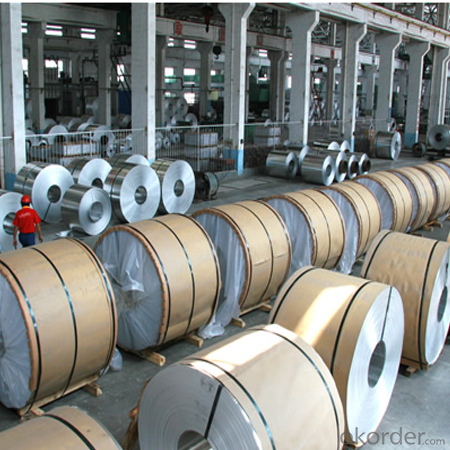
Manufacturing
Decoiler → Accumulator →Tension Leveler →Acid & Alkali Cleaner → Rinse →Conversion Treatment → Priming coater →Infrared Curing Oven →Main coater →Floatation Curing Oven →Strippable Film Applicator → Exit Accumulator → Recoiler
FAQ
--Q: Do you provide free samples?
--A: Yes, free samples will be sent to you on freight at destination.
--Q: Can I get your latest products catalogue?
--A: Yes, it will be sent to you in no time.
--Q: What is the MOQ?
--A: 2 tons
--Q: What are your payment terms?
--A: We accept L/C, T/T.
--Q: What kinds of alloy can you supply?
--A: 1000 series: 1050, 1060, 1070, 1100, 1145, 1200
3000 series: 3003, 3004, 3105, 3104
5000 series: 5052, 5083, 5754, 5182
6000 series: 6061, 6063, 6062, 6063
8000 series: 8011, 8021
--Q: What kinds of temper can you supply?
--A: O-H112: O,H12,H14,H16,H18,H22,H24,H26,H,32,H34,H111,H112
T3, T4, T6
- Q: What are the typical applications of aluminum coils in the automotive industry?
- Aluminum coils are commonly used in the automotive industry for various applications. They are primarily used in the manufacturing of heat exchangers, such as radiators and condensers, due to their excellent thermal conductivity. Additionally, aluminum coils are utilized in the production of car body panels, as they are lightweight and offer high strength-to-weight ratio, contributing to improved fuel efficiency. Moreover, they are also employed in the production of air conditioning systems, wiring harnesses, and electrical components due to their corrosion resistance and electrical conductivity properties.
- Q: Are aluminum coils suitable for lightweight panel applications?
- Indeed, lightweight panel applications can benefit from the use of aluminum coils. Renowned for their lightweight and corrosion-resistant properties, aluminum coils prove to be an exceptional option for these applications. With ease, aluminum coils can be molded and fashioned into panels of various sizes and thicknesses, showcasing their remarkable versatility. Moreover, the high strength-to-weight ratio exhibited by aluminum facilitates the production of robust and enduring lightweight panels. These panels find utility across a range of industries, including automotive, aerospace, construction, and transportation, where the reduction of weight is paramount. All in all, the lightweight nature, corrosion resistance, versatility, and strength of aluminum coils render them a fitting choice for lightweight panel applications.
- Q: Are aluminum coils resistant to UV radiation?
- Yes, aluminum coils are generally resistant to UV radiation. Aluminum is a highly durable and corrosion-resistant material, and it has natural properties that make it resistant to the damaging effects of UV radiation. Unlike certain other metals, aluminum does not oxidize or deteriorate when exposed to sunlight for extended periods of time. This makes it an ideal choice for applications where UV exposure is a concern, such as outdoor structures, solar panels, and automotive components. However, it is important to note that while aluminum is resistant to UV radiation, it can still be subject to other forms of degradation if not properly protected or maintained.
- Q: Just wondering if an aluminum and Fluoride bond can be created by boiling fluoridated water in aluminum cookware?
- It could be.....but the amount of fluoride in tap water is 1.2ppm, so even if you do, it won't have any effect :)
- Q: What are the different thicknesses available for aluminum coils?
- To meet different application needs, aluminum coils come in various thicknesses. The available options typically span from 0.2mm to 6mm. The thickness required depends on the intended use of the coil. For applications that prioritize flexibility and lightweight properties, thinner coils ranging from 0.2mm to 1mm are commonly used in electronics, packaging, and building materials. Medium thickness coils, ranging from 1mm to 3mm, find frequent use in automotive parts, roofing, and cladding applications. Conversely, heavier-duty industrial applications like shipbuilding, aerospace, and construction utilize thicker aluminum coils, measuring 3mm to 6mm in thickness. To determine the most suitable thickness for a given application, it is crucial to consider the specific requirements and intended use of the aluminum coil.
- Q: Is it safe to use aluminum coils in various applications?
- <p>Yes, aluminum coils are generally safe to use. They are widely used in various industries due to their excellent thermal conductivity, corrosion resistance, and lightweight properties. Aluminum coils are non-toxic and do not emit harmful substances, making them safe for applications such as food packaging and construction. However, safety can depend on specific uses and manufacturing processes, so it's important to ensure that the coils meet the required safety standards for their intended application.</p>
- Q: What are the factors that determine the price of aluminum coils?
- There are several factors that determine the price of aluminum coils. One of the main factors is the cost of raw materials. The price of aluminum is influenced by factors such as supply and demand, global economic conditions, and production costs. Fluctuations in these factors can directly impact the price of aluminum coils. Another factor that determines the price of aluminum coils is the manufacturing process. The cost of processing aluminum into coils involves various expenses such as labor, energy, and equipment. The complexity of the manufacturing process and the efficiency of the production line can affect the overall cost, which in turn influences the price of aluminum coils. Market conditions also play a crucial role in determining the price of aluminum coils. Factors such as market competition, industry trends, and geographic location can impact pricing. For instance, if there is a high demand for aluminum coils in a particular region but limited supply, the price may increase due to the scarcity of the product. Additionally, transportation and logistics costs contribute to the final price of aluminum coils. The distance between the manufacturing facility and the customer, as well as the mode of transportation, can affect the shipping expenses. These costs are typically factored into the overall price of the coils. Lastly, government policies and regulations can influence the price of aluminum coils. Tariffs, import taxes, and trade agreements may impact the cost of importing or exporting aluminum coils, thereby affecting the final price. In conclusion, the price of aluminum coils is determined by various factors including the cost of raw materials, manufacturing processes, market conditions, transportation costs, and government policies. It is essential for manufacturers and consumers to consider these factors when analyzing and forecasting the price of aluminum coils.
- Q: How are aluminum coils tested for quality control?
- Aluminum coils undergo several tests during quality control to ensure their reliability and performance. One of the primary tests is the dimensional inspection, where the physical dimensions of the coils are measured and compared against the specifications provided by the manufacturer. This helps to identify any discrepancies in length, width, thickness, or diameter. Another crucial test is the visual inspection, where the coils are thoroughly examined for any surface defects such as scratches, dents, or discoloration. This visual examination is essential to ensure that the coils meet the required aesthetic standards. To evaluate the mechanical properties, various mechanical tests are conducted. Tensile strength tests are performed to measure the resistance of the aluminum coils to breaking under tension. This test helps in determining the durability and strength of the coils. Additionally, hardness tests are carried out to assess the coil's resistance to indentation or deformation. The hardness values are compared against the predetermined standards to verify if the coils meet the necessary criteria. Further tests include corrosion resistance testing, where the coils are exposed to harsh environments or corrosive substances to assess their ability to withstand corrosion over time. This test is crucial as aluminum is often used in applications where it may come into contact with corrosive elements. Electrical conductivity tests are conducted to ensure the proper functioning of the coils in electrical applications. The conductivity is measured and compared with the required specifications to guarantee that the coils possess the desired electrical characteristics. In addition to these tests, other factors like chemical composition analysis, surface roughness evaluation, and coating adhesion tests may also be performed depending on the specific requirements of the aluminum coils. Overall, through these comprehensive quality control tests, manufacturers can ensure that aluminum coils meet the necessary standards, guaranteeing their quality, performance, and reliability in various applications.
- Q: Are aluminum coils suitable for curtain wall systems?
- Curtain wall systems can greatly benefit from the use of aluminum coils. This lightweight and durable material offers a multitude of advantages. Firstly, aluminum coils possess excellent corrosion resistance, ensuring the long-lasting and sturdy nature of the curtain wall system. This makes them particularly well-suited for exterior applications, where exposure to various weather conditions is inevitable. Moreover, aluminum does not rust, setting it apart from materials like steel. In addition, aluminum coils can be easily extruded into a wide range of shapes and sizes, allowing for flexibility and creativity in the design of curtain walls. This grants architects and designers the opportunity to create visually appealing and distinctive structures. Another notable feature of aluminum is its high sustainability. It is completely recyclable, meaning that it can be reused without any loss in quality. This makes aluminum coils an environmentally friendly choice for curtain wall systems, aligning with the growing demand for sustainable building materials. Furthermore, aluminum possesses excellent thermal and electrical conductivity, which can contribute to energy efficiency in curtain wall systems. By incorporating thermal breaks and insulation, aluminum curtain walls can effectively regulate temperature and reduce energy consumption, resulting in long-term cost savings. In conclusion, aluminum coils are an outstanding option for curtain wall systems due to their resistance to corrosion, versatility, sustainability, and energy efficiency.
- Q: Are aluminum coils suitable for high-pressure applications?
- No, aluminum coils are not suitable for high-pressure applications.
Send your message to us
Anodized Aluminum Coil Stock for Coated Aluminum Ceiling Panel
- Loading Port:
- Shanghai
- Payment Terms:
- TT OR LC
- Min Order Qty:
- 2 m.t.
- Supply Capability:
- 50000 m.t./month
OKorder Service Pledge
OKorder Financial Service
Similar products
Hot products
Hot Searches
Related keywords
